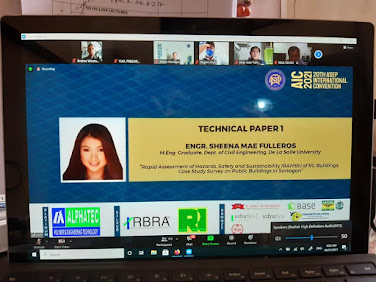 |
| Dr. Galasso with session moderators: Dr. Garciano and Dr. Oreta |
Dr. Carmine Gallaso of University College London presented a keynote lecture on two Newton-Agham Institutional - CHED Projects - PRISMH or Philippine Resilience of Schools to Multiple Hazards and CHERISH or Cultural Heritage Resilience and Sustainability to Multiple Hazards. The keynote lecture highlights the "New Technologies and Digital Tools for Assessing Multi-Hazard Risk of Community Assets."
Three papers that are outputs from research supported by the CESDR Disaster Resilience Unit were also presented at the 20th ASEP International Convention (AIC2021) on 20-22 May 2021.
Engr, Samantha Jarder, BSCE and MSCE graduate of DLSU, Manila and presently a PhD student at Tokyo City University presented the paper on "Toolkits for Strengthening ORDER in Schools or SOS" at the 20th ASEP International Convention (AIC2021) on 22 May 2021. The co-authors of the paper consist of DLSU Civil Engineering faculty, graduate and undergraduate students. The SOS project is a component of the PRISMH Project funded by CHED under the Newton-Agham Research Institutional Links. The faculty researchers include Dr. Lessandro Garciano (Principal Proponent), Dr. Andres Oreta and Engr. Richard De Jesus. The PRISMH Project is a collaboration among universities - University College London, DLSU and Xavier University - CDO.
Engr. Sheena Fulleros, M.Eng. graduate of DLSU, Manila presented the paper on "Rapid Assessment of Hazards, Safety and Sustainability (RAHSS) of RC Buildings: Case Study Survey on Public Buildings in Sorsogon." The paper is based on her Practicum Report as researcher of CESDR DRU under Dr. Oreta.




